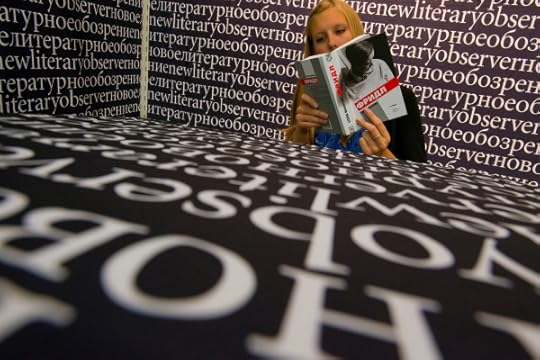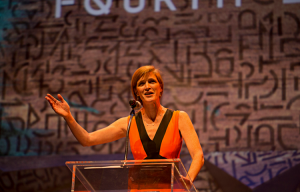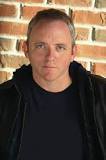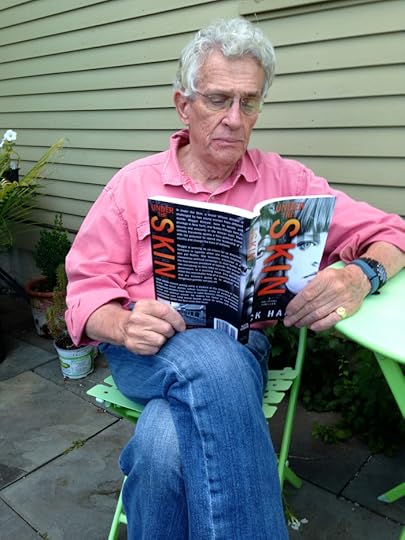Nick Hahn's Blog, page 33
August 14, 2013
August 13, 2013
Nick is interviewed by Toronto editor, Caroline Kaiser
Freelance Editing Services
New Book Release: Under the Skin by Nick Hahn
Posted on August 3, 2013
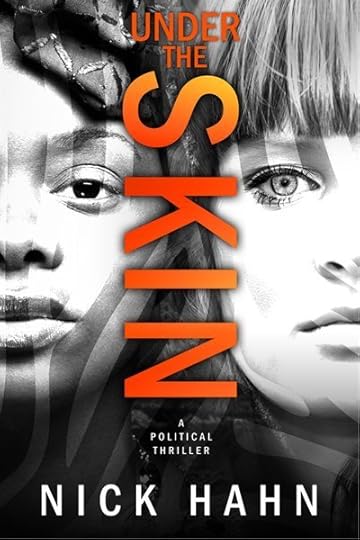 Nick Hahn is the author of the recently released novel Under the Skin, a political thriller set in Uganda. As this interview demonstrates, he is passionate about both the issues confronting third-world countries today and the craft of writing. Check out Nick’s blog,Nickspeak, as well as this link to Under the Skin, now available on amazon.com.
Nick Hahn is the author of the recently released novel Under the Skin, a political thriller set in Uganda. As this interview demonstrates, he is passionate about both the issues confronting third-world countries today and the craft of writing. Check out Nick’s blog,Nickspeak, as well as this link to Under the Skin, now available on amazon.com.CK: I know that you spent some time in Uganda. What took you there, and what experiences did you have that prompted you to write the book?
NH: I lived and worked in Uganda for several months in 2008. I was there on a consulting engagement, retained by a nonprofit consortium of three organizations evaluating the organic cotton supply chain from small farmers in the North near the Sudanese border to commercial yarn spinning factories in the South near Kampala, the capital of the country.
The consortium partners, Invisible Children, Inc., the Wildlife Conservation Society, andEdun Apparel LTD. were interested in sourcing a women’s apparel line in Uganda produced from 100 percent organic cotton. Edun, owned by Bono and Ali Hewson, collaborated with their consortium partners, both prominent NGOs, in an effort to support economic development for Uganda and add a measure of relief to poverty-stricken cotton farmers.
In my work I observed abuses of human rights, especially those of women, perpetrated by local authorities and self-centred politicians. Their refusal to acknowledge the disparity between the traditional role of women in tribal societies and advancements made by women in contemporary Western societies kept Ugandan women in a subservient role within the family. In Uganda, and much of Africa, women are forced to accept genital mutilation, prepubescent marriage to men many times their age, and abject slavery in their spousal roles.
My objective in writing this book is to build awareness of these abuses and do so within the context of fictional storytelling. I want my readers to be entertained, educated, and motivated. My hope is that some will be moved to action and make a difference within their own sphere of influence, whatever or wherever that may be.
Under The Skin is my first novel. The message is there but so is the emotion, tension, and entertainment.
CK: In the book, a young woman of very humble origins, Nabulunghi Kibugu (Nabby), becomes educated in a Western university and returns to her country to seize political power. We tend to think of East Africa as dominated by corrupt politicians and vicious warlords like Joseph Kony. In the Africa of today, how common are female leaders like Nabby? Would you say that African women are now emerging from the shadows of oppression? What are some examples of women in this part of the world who are making a difference?
My lead character, Nabby Kibugu, is fictional but her story could easily be true. Today women of all races, religions, and ethnicities are making their presence known in the world. Educated and motivated, women in all fields including politics, education, arts, science, and business are making a difference. In Africa this is particularly prescient. The role of women there has changed dramatically with the emergence of Nobel Prize winners like Ellen Johnson-Sirleaf and Wangari Maathai, the first woman from Africa to receive a Nobel Prize. This advancement is still in the incubation stage. When we see progress growing from a base of zero, we tend to overcelebrate it. Africa, the Middle East, and Muslim countries around the world are still generations out of step. I’ve lived and worked in most of these regions and have seen up close the devastating effect on women, whose lives are controlled by cultural and religious traditions created and enforced by men. My hope is that through the medium of fictional storytelling I might add a small voice in opposition to these abuses and lend some weight to a movement toward equality with men, if not full parity. The real tragedy here is the loss of intelligence and intuition that women bring to problem solving; life for men would improve exponentially with educated and trained women in their midst. My dream is that real-life Nabby Kibugus and Maggie Kincaids [Maggie is another character in the book] will emerge as thought leaders and role models, inspiring a new generation of women from the developing world.
CK: Nabby forms a powerful alliance with a wealthy American, Maggie Kincaid. The unlikely friendship that blossoms between the two young women is really at the heart of the novel, and the way they forge ahead in single-minded pursuit of their goal against overwhelming odds is quite incredible. Who or what inspired these two fearless females?
NH: Maggie was inspired by Nabby’s true grit and determination to change her world. Nabby’s youth was destroyed by Joseph Kony’s Lord’s Resistance Army (LRA) when she was raped at age eleven. This experience exposed her strength in ways she wouldn’t have known otherwise. Her acceptance of the scholarship to St Andrews University and her successful career there made a lasting impression on Maggie and her wealthy parents in New York. When Maggie arrived in Uganda and became involved in Nabby’s political campaign, it changed her world from one of luxury and excess to one of purpose and resolve. Together these two young women changed more than a country’s leadership; they changed the course of each other’s lives.
My book is written primarily from a woman’s point of view. I can’t explain this except to say that I’ve been blessed in having strong women in my life, women who have inspired me with their strength and discipline. I believe that if women held positions of authority in all fields, but especially government, there would be less conflict in the world and the rights of women and men—human rights—would be recognized. Women understand the power of moral authority in society and know how to exercise it. They appreciate that passive resistance can be stronger than armed resistance, and that we should not be defined by race, religion, or territory. One looks at political leaders like Aung San Suu Kyi of Burma, Camilla Vallejo of the University of Chile Student Federation, Ellen Johnson-Sirleaf of Liberia, Christine Lagarde of the International Monetary Fund, the late Margaret Thatcher, prime minister of England, or Hillary Clinton, former secretary of state and likely candidate for US president in 2016. These women and others like them are changing their worlds in positive ways, both large and small. The title of my book, Under The Skin, drove much of my thinking. The notion that skin colour should make a difference in our perception of people and their worth to society strikes me as absurd. As shown in my novel, our hearts beat the same under the skin, regardless of our colour.
CK: The book really opened my eyes to the desperate struggles the Ugandan people face, and I’m sure it will for other readers as well. What do you hope people will take away from reading your book? Is there any particular message you want people to understand?
NH: The message is simple; we’re all members of the same race, the human race. For some unfathomable reason, men have insisted on defining themselves by race, religion, and ethnicity rather than the common spark of humanity that separates us from the beasts. That spark should be joining us, not dividing us. If we can put men on the moon, put the entire world’s knowledge base on a smartphone in the palm of our hand, and discover cures for “incurable” diseases, wouldn’t you think we could find a better solution to world problems than armed combat? Social, economic, and territorial conflict is real and requires thoughtful solutions, but not those found in the barrel of a gun or rooted in a dictator’s nepotism. I’m not suggesting that women have all the answers; I am suggesting they have more of the answers than history gives them credit for. My hope is that women like my character Nabby Kibugu, languishing in the backwater of some third-world country, will find their voice and aspire to education and training. We have no idea how many Nabbys are out there, waiting for another Maggie Kincaid to discover their genius.
CK: How long have you been writing? Who are the writers who inspire you and why?
NH: I started writing in high school. I had a disciplined English teacher at a strict Jesuit prep school in Cleveland, Ohio, who thought my writing showed promise and that I should pursue a career as an author. That was the age of the great American writers: Hemingway, Fitzgerald, Faulkner, and Steinbeck. They all inspired me, but I must confess that Hemingway was my hero. I loved his work and his macho lifestyle as a war correspondent, bullfight enthusiast, and deep-sea fisherman. Hemingway lived as he wrote. His stories were more than figments of his imagination; they were fictionalized memories of a man who lived his dream. It was his love affair with life that drove him to end his own. Once his health failed and he was no longer able to live as he wrote, he could no longer bear the alternative.
I carried this romanticized view of becoming an author into my college years at the University of Notre Dame. It was there that I succumbed to the real world of earning a living and raising a family. My writing dreams went on the back burner as I pursued a business career for forty-eight years. I served as President & CEO of NY based Cotton Incorporated for for twenty of them. Time and circumstance reignited my love of writing. I started by recording and publishing commercial audiobooks for Audible and soon realized what I had been missing. With a career behind me and a family on their own, I went back to where it all began. As T.S. Elliot reminds us, “We shall not cease from exploration, and the end of all our exploring will be to arrive where we started and know the place for the first time.”
At heart I’m a writer, have always been a writer, and will continue to write as long as my physical and mental health allow me.
CK: Now that Under the Skin has been completed, what do you hope to write about next? Are there any particular issues you want to explore?
NH: The issues that concern me are many, but there’s one in particular, and next on my writing agenda is human trafficking. This is one of the most deplorable evils in human society and one most of us know little about. Many people aid and abet traffickers by hiring illegal aliens at substandard wages, procuring the services of underage prostitutes, and paying access fees to pornography websites. Human trafficking has an estimated annual turnover of $32 billion, with far more unaccounted for. My next book, Drone, addresses this issue through the eyes of a female undercover agent working for Interpol, the secretive international police organization. Again, the story is fiction, but the subject matter and circumstances our lead character encounters are true, and the message is clear. Drone, like Under The Skin, will entertain and frighten you and stimulate your emotions, but you won’t finish the book without gaining a new perspective on human trafficking and sexual slavery in the US and around the world. Like my first book, this one is being written from a woman’s point of view. The lead character, Cosita, will scratch your conscience and move you to a heightened awareness of one of the world’s most misunderstood crimes and its degrading effect on women. Drone is a story about another courageous woman and a friendship formed in a tempest of mutual need and respect.
CK: What has the process of completing your first novel been like, and what sort of advice do you have for writers?
NH: I’ve never had a baby, Caroline, but the fourteen-month gestation period for this novel and the labour during the days preceding its release to the public gives me some idea of what that’s like. For me, as with mothers, it was a labour of love. I never wanted to let it go; every time I reviewed it, I saw areas needing improvement. It was like, “How could you have said it that way, dummy? You can write better than that.” And so it would go, day after day, until my editor convinced me I had a book and to let her smooth out the rough edges.
I have so much advice for new writers, I hardly know where to begin, so I guess I’ll just restate the obvious: begin. Put words on paper, i.e., your word processor, every day. Find your creative sweet spot, that time of day when ideas seem to flow effortlessly. Mine is early morning, but for others it’s evening or the middle of the night—whatever works for you. But do it. I might also suggest that you not read too many books on writing. In the end your storyline will carry your book, not your sentence structure or preoccupation with the beginning, the middle, and the end. I find that the words come to me scene after scene, but I must confess—and my editor reminds me—that I have problems with chronology and time sequence. I tend to worry less about that, I concentrate on the creative process of developing a story that first entertains, but for me, always with a message. As a first-time author with one published book to my credit, I don’t presume that my advice to writers will be all that prescient. Find your own style, your own story, and make sure you fall in love, deeply in love, with your characters. They will become the most important people in your life for the duration of the book.
For me it was about narrative and dialogue. I want my readers to feel the emotion, the tension, the anxiety, all the demands of life wrapped up in a character’s role. I’m a storyteller first and a writer second, if that makes sense. There are passages and whole scenes in this book that bring tears to my eyes each time I read them. I welled up when those words were written, they weren’t my words—they were Nabby’s and Maggie’s and other characters in the book. Maybe that’s the litmus test for a writer; maybe it’s about human emotion and finding words to express it. In Under the Skin, I found the right words.


August 12, 2013
August 11, 2013
Samantha Power Praises “Stop Kony”-Style Activism In First Speech As U.N. Ambassador
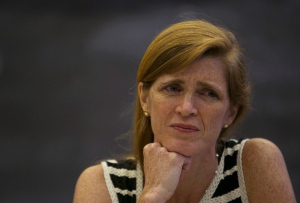
Samantha Power
US Ambassador to The United Nations
WASHINGTON — Samantha Power will praise online human rights activism such as last year’s “Stop Kony” campaign in her first speech as U.S. Ambassador to the United Nations on Saturday.
Power is scheduled to speak to the Fourth Estate Leadership Summit, an event in Los Angeles sponsored by Invisible Children, the rights group whose campaign to stop Ugandan warlord Joseph Kony went viral last year and whose co-founder was hospitalized after a notorious public breakdown.
“Invisible Children doesn’t just lobby policymakers to go after the LRA, it designs fliers that tell LRA fighters how they might defect, and it distributes them – more than 400,000 so far – into LRA-affected areas in DRC and the Central African Republic,” Power will say, according to prepared remarks. “It has also built six locally-run FM radio stations in areas of high LRA activity. These stations now reach an audience covering more than 29,000 square miles.”
And if you’ve ever doubted your activism matters, just think that the Kony video you made go viral, was sent by high school kids in Massachusetts to their Senator who joined with his colleagues to write a law that President Obama signed to create a rewards program to bring Kony and his thugs to justice. And a few months ago that Senator from Massachusetts, now Secretary of State John Kerry, announced that thanks to that law – thanks to you – the State Department was offering the first cash rewards to bring LRA killers to justice.
This new kind of activism is visible so many places, on so many of today’s most critical issues. An army of citizen activists police the conduct of the recent Kenyan elections, using the tools of the web to monitor hate speech and document fraud in an effort to prevent a repeat of significant violence. In a region – the Arab world – that barely knew democracy as recently as three years ago, we see tens of millions of people moving governments, and, at times, removing them, driven by that universal desire to have their voices heard. At a time of economic uncertainty, we see tens of thousands taking to the streets in Russia and beyond, because they are no longer willing to turn a blind eye to corruption or to accept the growing inequalities in their own societies.
In the speech, Power, whose first career was as a journalist covering human rights atrocities in Bosnia, will acknowledge the limitations of the Stop Kony model.
“But this new generation understands that the video is not what matters; the number of twitter followers is not what matters,” Power will say. “These are just means to an end; indeed Invisible Children the organization is a means to an end. What matters is the real world scoreboard.”
Power’s speech will also feature a tribute to Malala Yousafzai, the Pakistani teenager who was shot by the Taliban and who has become a global icon of women’s rights in the developing world. Power will describe Yousafzai’s name as a “name that will be forever synonymous with dignity and bravery,” according to the remarks.


August 9, 2013
From Mark Matousek’s “Open Book” newsletter.
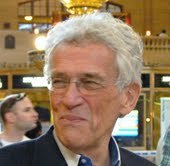 My student, Nick Hahn, has just published his first novel UNDER THE SKIN. It’s the story of two women caught in an intercultural drama about race, colonialism, passion, and gender.
My student, Nick Hahn, has just published his first novel UNDER THE SKIN. It’s the story of two women caught in an intercultural drama about race, colonialism, passion, and gender.Nick Hahn started writing while a student at the University of Notre Dame. His travel diaries reflect fourteen years of working among indigenous peoples from Africa to Latin America, where he witnessed social and political unrest. He makes his home in rural eastern Connecticut near Long Island Sound, where he writes and narrates audio books.
Excerpt from UNDER THE SKIN by Nick Hahn
August 1, 2013 at 6:15pm
The hall was so quiet, you could have heard a pin drop. She began to speak.
“Your Highnesses, members of the Nobel Committee, and distinguished guests, I am deeply honored to accept this prize and do so with gratitude-not for myself, but for the thirty-five million people of the Republic of Uganda. To be selected by the Nobel Committee one year after the iconic Ellen Johnson-Sirleaf and Leymah Gbowee of Liberia is truly historic; I don’t belong in the company of such women. You have celebrated me as a peacemaker, a title I accept with profound humility.
“Uganda is emerging from the dark shadows of oppression and corruption that have crippled her economy and muted her citizens for decades. The committee has seen fit to distinguish her, and in so doing, casts a ray of hope on a world beset by prejudice and ignorance. Uganda and all of Africa welcomes this spotlight; we welcome the eyes and ears of the world upon us as we take our place with you, our brothers and our sisters living together as one race-the human race.
“This is a new age, an age of instant communication and transparency. This should be an age when the races, faiths, and cultures of the world coexist without bias or prejudice. This should be a world without borders defining us, a world of intellectual and spiritual enlightenment. This should be a world where women stand equally with men, where human rights are stronger than property rights, where passive resistance is stronger than armed resistance, and where moral authority is stronger than civil authority. A world where all people know that under the skin their hearts beat the same.”
The audience embraced her words with stunned silence. They wouldn’t let her go. This woman was not preaching or delivering a lecture; she spoke from the heart with eloquence and conviction. Her voice was soft and conversational, as if she were sitting in your living room, not this cavernous hall. She used no notes and looked directly at the audience, sweeping her eyes from left to right and front to back at a practiced pace, her delivery mesmerizing. Her stage presence was commanding; she was a leader, and it showed. This distinguished audience recognized a sovereign when they saw one, and they interrupted her over and over again with applause.
“Many are to be thanked for my presence here this evening. However, none more so than the three who have traveled to Oslo to share this moment with me and the people of Uganda.
“First, from New York, my dearest and closest friend Margaret “Maggie” Kincaid, who supports me with love and respect, not judgment. Second, from Gulu, Uganda, my teacher and mentor Evelyn Simonton. And last, but not least, the man who motivates me every day, who stands by my side through good times and bad, the man I love, from Kitgum, Northern Uganda, my life partner and protector Jude Wambuzi.
“I would be remiss in not mentioning Jolly Bukenya, my election campaign manager, who sadly could not be here with us. I would not be standing here before you today if it hadn’t been for Jolly’s uncompromising vision for a better Uganda and her unending support.
I was seated in the middle of the room between Evelyn and Jude. My thoughts swung between pride and admiration for what this young woman had achieved. No one in this hall, except us, her closet friends and allies, knew what she had gone through to stand on that stage. How I wished Jolly could have been there to see her.
Nabulungi “Nabby” Kibugu had been my friend since childhood; we’d grown up as pen pals. The photos she had sent me showed a gangly black teenager with knotted hair and dusty bare feet kicking a deflated soccer ball near the river and chasing her pet crane. Nothing she’d done as a teenager would portend this moment in Oslo. She had been a miracle waiting to happen, and fortunately for the people of Uganda and all of Africa, miracles do happen. It made me wonder how many other miracles in Africa and the third world were waiting to happen through education and training.
A single voice can be powerful, as Ellen Johnson-Sirleaf taught us. She forged a political career from the ore of ignorance and cultural indifference toward women in a country torn by civil war and a history of despotic leadership. Her journey to the presidency of Liberia in 2005 and her reelection in 2011 were tumultuous, but her strength and resolve would not be denied. She became the first woman to be elected president of an African country. Her speaking style was riveting, attracting invitations to address international forums and attendant recognition as a female head of state in an African country. This status made her the “token black female” on boards of trustees for prominent NGOs and foundations, giving her access to a network of global thought-leaders as she advanced international acceptance of moral authority in a world weakened by corrupt civil authority.
Nabby emulated Johnson-Sirleaf. I had watched her develop over the years as a student leader, a spokesperson for women’s rights, and an advocate for democratic reform in a country mired in autocratic rule and corruption. She had leveraged her tribal roots to political advantage and confronted government leaders who had sucked the lifeblood from the Ugandan economy and compromised the welfare of her people for personal gain. Never could I have imagined that this impoverished teenager from a rural backwater village in war-torn Northern Uganda would be standing before a prominent international audience accepting the world’s most prestigious honor.
I’m not a religious person, but when Nabby finished speaking, at that moment and in that place, I felt that something spiritual was happening. The audience was on its feet, the applause deafening. Tears traced down my cheeks as I clapped my hands until they hurt. Dear God in heaven, what an emotional moment for the Ugandan people, and for me.
As I waited for the Nobel press corps to complete their post-ceremony interview, my mind drifted back to Fifth Avenue and the first time I’d heard the funny-sounding name of Kibugu, a name now resonating with millions. How did an eleven-year-old girl raised in midtown Manhattan, attending exclusive private schools and taking lessons in dance, flute, and gymnastics, manage to connect with a poor, unremarkable child in Northern Uganda attending public missionary schools, where extracurricular activities consisted of tending goats and carrying water from a communal well?
The story begins in 1976 when my mother, Maxine Katherine O’Donnell, first laid eyes on my father, Simon Robert Kincaid.


August 7, 2013
Uganda Groups Oppose Public Order Bill
Last updated on: August 07, 2013 4:54 PM
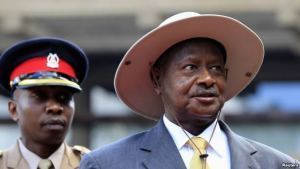 Uganda’s civil society and opposition groups are scheduled to meet Internal Affairs Minister General Aronda Nyakairima today (Thursday) to complain about a proposed law they say could undermine the nation’s constitution.
Uganda’s civil society and opposition groups are scheduled to meet Internal Affairs Minister General Aronda Nyakairima today (Thursday) to complain about a proposed law they say could undermine the nation’s constitution.“This meeting is to first of all educate this new minister about how bad this bill (Public Order Management Bill 2011) really is,” said Geoffrey Ssebaggala, the national coordinator of Uganda’s Human Rights Network for Journalists, (HRNJ-U).
“We will also target the speaker of parliament because they violated an article in the constitution,” said Ssebaggala. “We will also reach out to the international community by targeting their local offices here to bring this to their attention, so they can inform their countries [so] they can think about what they can do to support Ugandans to be free to exercise their freedom.”
The bill, which President Yoweri Museveni has yet to sign into law, was passed by parliament Tuesday. It demands that organizers of public rallies, gatherings and protests first seek police permission.
Those opposing the bill say it violates the rights of Ugandans to freely associate, a right guaranteed by the constitution. Ssebaggala says they met Wednesday and reached a series of decisions.
“We resolved to go to court and challenge the constitutionality of this bill,” he said. “But at the same time, we also realized that Article 92 of the constitution prohibits parliament to pass any law to alter the decision or judgment of any court.
“This was [the same] bill which was quashed by the constitutional court,” he continued. “It said the police have no powers granting permission to Ugandans who would want to have an assembly to express their grievances.”
“The government of Uganda does not believe in constitutionalism,” Ssebaggala said. “They are only interested in curtailing freedoms …”
Ssebaggala said the groups plan to begin educating the public about a citizen’s rights and freedoms under the constitution as well as the dangers associated with the passage of the Public Order Management Bill.
But supporters of the ruling National Resistance Movement (NRM) defend the bill, saying it will enable the security agencies to prevent violence associated with protests and demonstrations.
Ssebaggala says the groups have called on the international community to pressure Museveni not to sign the bill into law.
“The international community must engage the Uganda government, but we know even when they engage in talks, this government will not listen. The language they will listen to will be cutting aid or threatening to cut aid that might go to the police,” said Ssebaggala.


August 4, 2013
Amazon “Best Sellers” in thriller/political category.
Thought for the day.
“There’s something ugly about the flawless.”
August 4, 1965: Happy birthday, Dennis Lehane! Many of the American novelist’s tough, Boston-based mysteries have hit the big screen including Mystic River, Shutter Island, and Gone, Baby, Gone. He turns 48 today.






